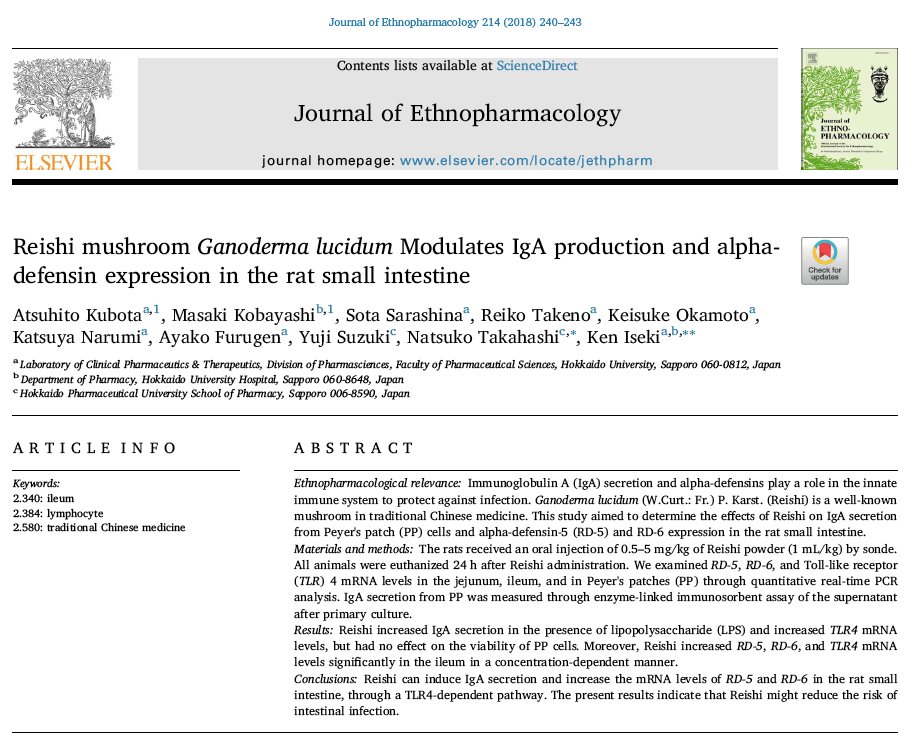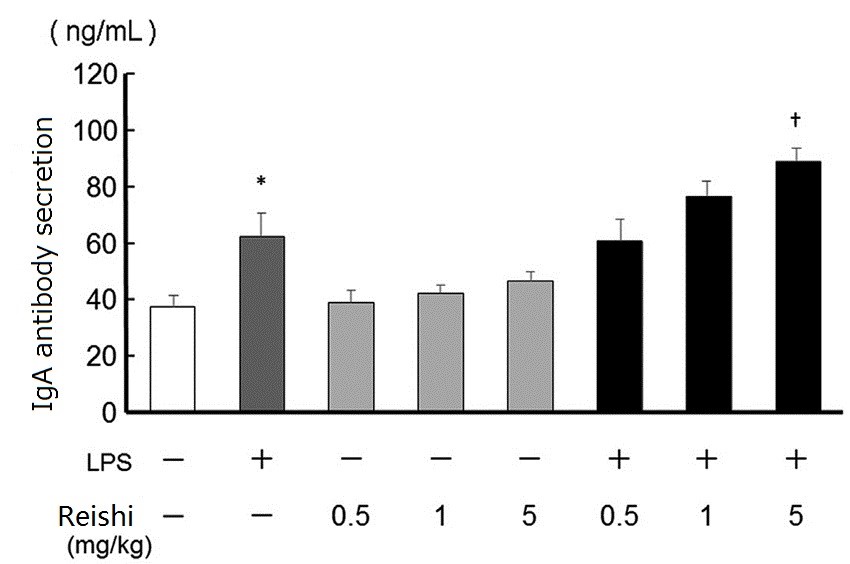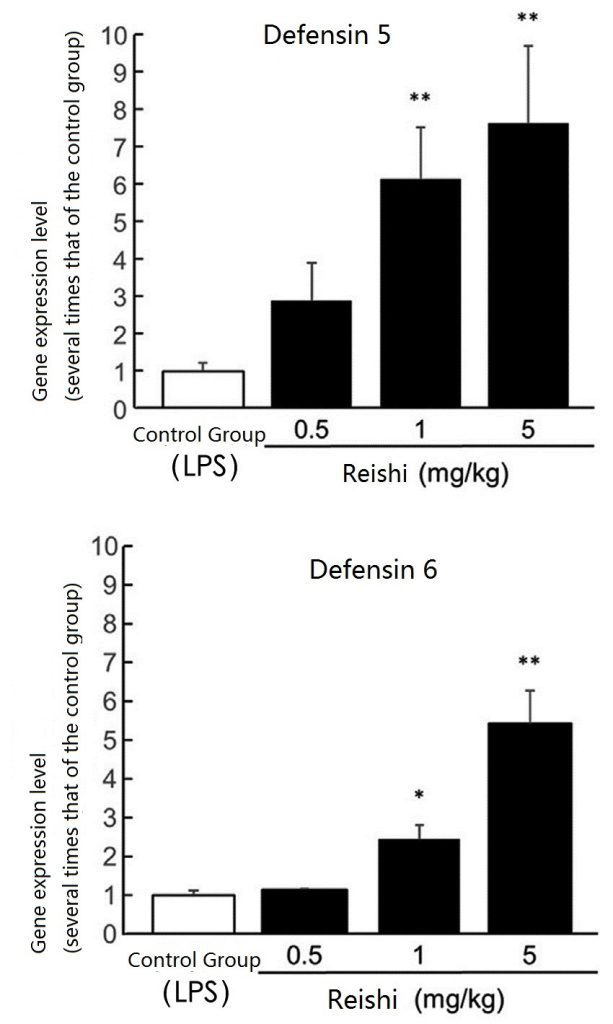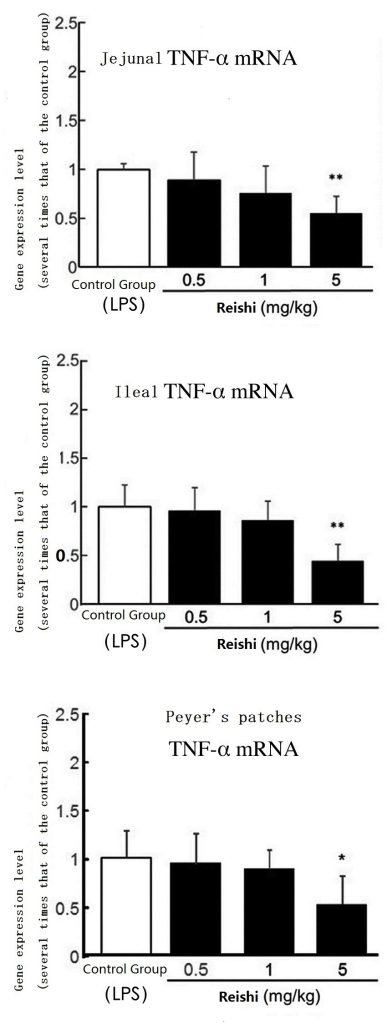3월 25, 2018/홋카이도 대학 & Hokkaido Pharmaceutical University/Journal of Ethnopharmacology
Text/ Hong Yurou, 우팅야오

IgA antibody and defensin are the first line of immune defense against external microbial infections in the intestines. According to a study published by Hokkaido University and Hokkaido Pharmaceutical University in the Journal of Ethnopharmacology in December 2017,영지버섯 can promote the secretion of IgA antibodies and increase defensins without causing inflammation. It is obviously a good helper for improving intestinal immunity and reducing intestinal infections.

When pathogenic bacteria invade, 영지버섯 will increase the secretion of IgA antibodies.
The small intestine is not only the digestive organ but also the immune organ. In addition to digesting and absorbing nutrients in food, it also defends against various pathogenic microorganisms that come in from the mouth.
그러므로, in addition to the countless villi (absorbing nutrients) on the inner lining of the intestinal wall, there are also lymphatic tissue called “Peyer’s patches (PP)” in small intestine, which serve as immune goalkeepers. Once pathogenic bacteria are discovered by macrophages or dendritic cells in Peyer’s patches, it will not take long for B cells to secrete IgA antibodies to capture pathogenic bacteria and build the first firewall for the intestinal tract.
Studies have confirmed that the greater the secretion of IgA antibodies, the more difficult it is for pathogenic bacteria to reproduce, the weaker the mobility of pathogenic bacteria, the harder it is for pathogenic bacteria to pass through the intestine and enter the bloodstream. The importance of IgA antibodies can be seen from this.
In order to understand the effect of영지버섯 on IgA antibodies secreted by Peyer’s patches in the wall of the small intestine, researchers from Hokkaido University in Japan took out Peyer’s patches in the wall of the small intestines of rats and then separated the cells in the patches and cultured them with the lipopolysaccharide (LPS) from Escherichia coli for 72 시간. It was found that if a considerable amount of영지버섯 was given during this period, the secretion of IgA antibodies would be much higher than that without Ganoderma lucidum – but low-dose영지버섯 had no such effect.
하지만, under the same conditions of time, if only the Peyer’s patches cells are cultured with영지버섯 without the stimulation of LPS, the secretion of IgA antibodies will not be particularly increased (아래 그림과 같이). 확실히, when the intestine is facing the threat of external infection, 영지버섯 can increase the defense level of the intestine by promoting the secretion of IgA, and this effect is proportional to the dose of영지버섯.

효과영지버섯 on the secretion of antibodies by lymph nodes of the small intestine (Peyer’s patches)
[메모] The “-” at the bottom of the chart means “not included”, and “+” means “included”. LPS comes from Escherichia coli, and the concentration used in the experiment is 100μg/mL; 영지버섯 used in the experiment is a suspension made of ground dry Reishi mushroom fruiting body powder and physiological saline, and the experimental doses are 0.5, 1, 그리고 5 mg/kg, 각기. (소스/J Ethnopharmacol. 2017 12월 14;214:240-243.)
영지버섯 usually also improves expression levels of defensins
Another important role in the forefront of intestinal immunity is the “defensin”, which is a protein molecule secreted by the Paneth cells in the small intestine epithelium. Merely a small amount of defensin can inhibit or kill bacteria, fungi and certain types of viruses.
Paneth cells are mainly concentrated in the ileum (the second half of the small intestine). According to the animal experiment of the study, in the absence of LPS stimulation, rats were administered intragastrically영지버섯 (at the dose of 0.5, 1, 5 mg per kg body weight) ~을 위한 24 시간, the gene expression levels of defensin-5 and defensin-6 in the ileum will increase with the increase of the영지버섯 정량, and are higher than the expression levels when stimulated by LPS (아래 그림과 같이).
확실히, even in peaceful times when there is no threat of pathogenic bacteria, 영지버섯 will keep the defensins in the intestines in a state of combat readiness to respond to emergencies at any time.

The gene expression levels of defensins measured in the rat ileum (the final and longest segment of the small intestine)
영지버섯 does not cause excessive inflammation
In order to clarify the mechanism by which영지버섯 activates immunity, the researchers focused on the performance of TLR4. TLR4 is a receptor on immune cells that can identify foreign invaders (such as LPS), activate the message-transmitting molecules in immune cells, and make immune cells respond.
The experiment found that whether영지버섯 promotes the secretion of IgA antibodies or increases the gene expression levels of defensins is closely related to the activation of TLR4 receptors – TLR4 receptors are the key for영지버섯 to enhance intestinal immunity.
Although activating TLR4 can improve immunity, over-activation of TLR4 will cause immune cells to continuously secrete TNF-α (tumor necrosis factor), causing excessive inflammation and posing a health threat. 그러므로, the researchers also tested TNF-α levels in the small intestine of rats.
It was found that TNF-α expression and secretion levels in the anterior and posterior segments of the small intestine (jejunum and ileum) and in the Peyer’s patches on the intestinal wall of rats were not particularly increased when영지버섯 was administered (아래 그림과 같이), and high doses of영지버섯 could even inhibit TNF-α.
그만큼영지버섯 materials used in the above experiments are all prepared by grinding dried영지버섯 fruiting bodies into fine powder and adding physiological saline. The researchers said that because the영지버섯 used in the experiment contains ganoderic acid A, and past studies have shown that ganoderic acid A can inhibit inflammation, they speculate that in the process of enhancing intestinal immunity by영지버섯 다당류, ganoderic acid A may well have played a balancing role at the right time.

TNF-α gene expression measured in various parts of the small intestine of rats
[원천] Kubota A, et al. Reishi mushroom Ganoderma lucidum modulates IgA production and alpha-defensin expression in the rat small intestine. J 에스노파마콜. 2018 3 월 25;214:240-243.
끝
저자 소개 / 씨. 우팅야오
Wu Tingyao는 이후 직접 Ganoderma 정보를 보고해 왔습니다. 1999. 그녀는 다음의 저자입니다.Ganoderma로 치유 (4월 인민의학출판사에 게재 2017).
★ This article is published under the exclusive authorization of the author.
★ 위 작품은 복제할 수 없습니다, excerpted or used in other ways without the authorization of the author.
★ 위 사항을 위반한 경우, the author will pursue relevant legal responsibilities.
★ 이 기사의 원문은 Wu Tingyao가 중국어로 작성하고 Alfred Liu가 영어로 번역했습니다.. 번역 내용에 차이가 있는 경우 (영어) 그리고 원본 (중국인), 원래 중국어가 우선합니다. 독자들이 궁금한 점이 있으면, 원작자에게 연락주세요, 양. 우팅야오.



